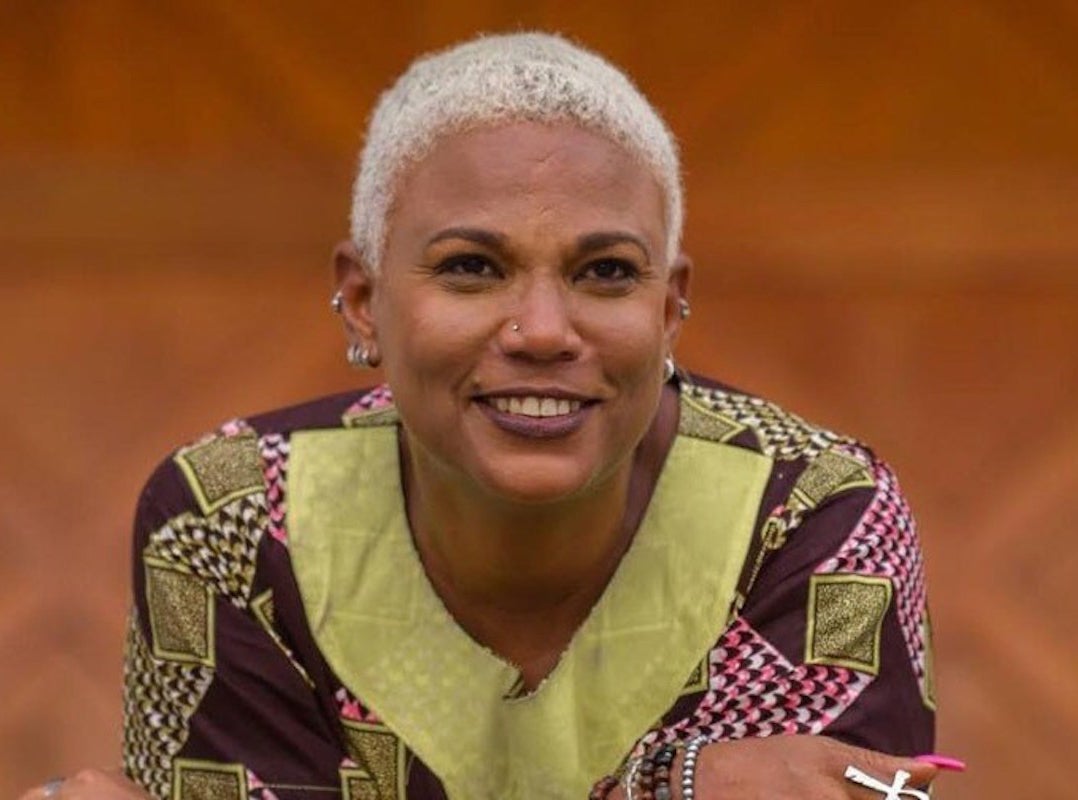KINGSTON, R.I. – Feb. 9, 2023 – Raised in Kingston, Jamaica, by parents who were Rastafarian, Taitu Heron was taught to always question the system, analyze and call out discrimination. Yet there was an inherent conflict in a patriarchal culture between how she experienced growing up in comparison to her brothers. It was perhaps that experience, combined with a healthy dose of adolescent rebellion, that led her to become involved in activism.
Now, as a Caribbean scholar, activist, and performance poet, Heron will visit the University of Rhode Island Kingston Campus February 12 to 17 as part of the College of Arts and Sciences’ Annual Lecture Series on African American, Black Diaspora and Black Global Lives. During her visit, Heron will meet with students, faculty, community organizations within the state, as well as well as advocacy groups on and off campus that are invested in rights and issues connected to gender and sexuality. The “African-Caribbean Intersectional Engagement Series,” is a collaboration between the University’s departments of Africana Studies and Gender and Women’s Studies.
“The goal of the series is to engage various layers of the URI community in a dialogue about the way feminist praxis and intersectional gender and LGBTQIA issues overlap and differ between the English-speaking Caribbean and United States,” said Catherine John-Camara, professor and chair of URI’s Department of Africana Studies. “By looking at the way these issues of race, gender and sexuality have changed over time in other countries, we also learn more about ourselves.”
As the head of the Women and Development Unit at the University of the West Indies, Open Campus, Heron is deeply devoted to supporting and promoting women’s development through training, research and community outreach. She has led projects and programming and conducted research impacting Caribbean development, particularly in areas such as gender-based violence, LGBTQ citizenship, women’s participation in democratic governance; vulnerability and the girl child; and sexual and reproductive health.
On Monday, Feb. 13, Heron will hold a Faculty Innovation Session focused on the epistemological shift in social science data collection frameworks, and how those categories had to change in the post-independence Caribbean. Occurring in the Caribbean as early as the 1970s, this required a rethinking of previous assumptions – both racist and classist – that had been ingrained in colonial frameworks. The session, co-sponsored with Amelia Moore in Marine Affairs and Sarah Brown in Computer Science, will include a discussion on how the framework for analyzing data in the sciences in the United States differs. Faculty members interested in attending should contact Melissa Joseph, mdejoseph@uri.edu, for additional details.
On Tuesday, Feb. 14, Heron will hold a student workshop, “Finding and Keeping Your Voice,” that will help students wrestle with the gap they feel between the pressures of verbal expression in academic spaces and the culture of home, family and friends. The workshop aims to provide students with tools to find and keep their voice, manage anger and frustration, and stay whole.
“I think this applies to all students, in a way, depending on their backgrounds – whether it is someone from a rural background coming to a city, someone who may be a first-generation college student, someone for whom English is not their first language, someone coming from a community of color to a less diverse environment, or any student really,” said John. “The further that person’s identity is from the culture of the classroom, that separation can leave them feeling much more overwhelmed and susceptible to anxiety or depression. The workshop will provide students with tools to better navigate that experience in a healthy way.”
The workshop will be held from 1 to 3 p.m. on the second floor of the Memorial Union, 50 Lower College Road, Kingston, in the Gallery (next to the Ballroom). The workshop is open to all students.
Later, on Feb. 14, Heron will lead a poetry jam from 5 to 7:30 p.m. in the Memorial Union Atrium 2. This open mic event, hosted by the Africana Studies Student Advisory Council in collaboration with several other student organizations, will provide all participants with the chance to express themselves. Heron will recite selections of her own poetry while those who wish to share their own work will have the opportunity to compete for prizes. This event is free and open to all members of the University community.
On Wednesday, Feb. 15, Heron’s visit will culminate in a public lecture and roundtable discussion entitled, “What are we Fighting for? Feminist Challenges and the Search for Dignity in Gender Equality Work in the Caribbean.” In her lecture, Heron will share the challenges, in Anglo-Caribbean contexts, of incorporating feminist frameworks into gender-oriented activist spaces dealing with issues such as: food insecurity, physical safety, access to shelters and childcare as well as economic survival. She will also address the cultural and structural differences between LGBTQIA communities in the English-speaking Caribbean and the United States.
Following the lecture, Heron will participate in a roundtable discussion with several Caribbean scholars at the University, led by John. Preity Kumar, assistant professor of gender and women’s studies; Karen Sweeting, assistant professor of political science; and Tashal Brown, assistant professor of urban education and secondary social studies; along with John will raise questions based on Heron’s lecture and share what they’ve learned as a result of their own studies.
The lecture and roundtable discussion will be held from 5 to 7 p.m. in the Center for Biotechnology and Life Sciences, Room 10, 120 Flagg Road, Kingston. This event is free and open to the public.

